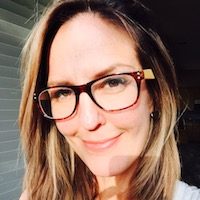We can all name the obvious, life-changing, grief-filled events that happen to us and our loved ones, as well as the appropriate responses that go along with them.
Our best friend’s mother dies, so we send a card, remember to check in weekly, and bring food. Maybe we even stood vigil at her hospital bedside before she died.
Our neighbor’s dog dies, so we acknowledge her grief with a kind note and a long talk on the front lawn about how we loved her dog too, even when he peed on our rose bushes.
When the parent of one of our children’s friends dies in a tragic car accident, we spearhead a fundraiser to cover the cost of the funeral expenses. Then we gather everyone to sign a card and organize a food delivery schedule.
No question, these are lovely, appropriate gestures. We know how to be there for these sorts of events. We’ve learned that casseroles and cards and condolences are the norm. It shows that we are sensitive to someone’s grief.
But do we know how to handle the kind of grief that doesn’t have its own section at the Hallmark store?
What do we say when a friend terminates a pregnancy and then falls into a state of unexpected grief? Oh, now that’s trickier, isn’t it?
What about grieving the death of a married lover? We think, “God, no one knew we were even together. How do I get through this?”
How about when someone we know has committed a crime and goes to prison? There’s actually a name for that: prison grief.
What about the death of our ex-husband or ex-wife? Some people say they’ve had well-meaning friends announce, “Well, now you’re really rid of him”—not helpful when we’re replaying our best years with him on an endless loop.
And what happens when we get diagnosed with a sexually transmitted disease?
Or give a baby up for adoption?
Or lose our home?
Or get clean after years of addiction?
Or get a divorce?
Or suffer through being estranged from family?
Or lose our independence?
Or find ourselves in an empty nest?
Or deal with a loved one who has a severe mental illness?
There are hundreds of ways we experience what is known as “disenfranchised grief,” which is defined as: grief that cannot be openly expressed because the death, or other loss, cannot be publicly acknowledged.
We have not been taught how to recognize disenfranchised grief in ourselves, let alone know how to bear witness to someone else’s. No one brings a casserole to these kinds of events.
I was diagnosed with early stage 1 breast cancer in 2008.
As I had a strong family history of breast cancer, and two small children at the time, I opted for a radical double mastectomy with reconstruction. The surgery was successful and the reconstruction was textbook.
I survived. I escaped needing to have chemo. I had a future to look forward to again.
I was lucky. So why, a year later, did I sink into the deepest depression of my life? I sat in my bathtub sobbing and told my husband I wanted to end my life.
We can all take a turn analyzing why the depression took hold when I had received a clean bill of health. Through my diagnosis and surgery I had my share of people around me saying, “You’re so lucky to be alive” and, “At least you have the option to have reconstruction” or my favorite, “You should be grateful every day it wasn’t worse, cause when my Aunt Sally was diagnosed…” All of those things were true, but the dismissive comments took away my chance to grieve what was coming up for me.
First, I’d lost a body part—two, in fact, but who’s counting. But more importantly, I was staring my own mortality in the eyes when all around me the messaging was “be grateful.” I imagined dying young. I counted life chances I would miss. I envisioned how my parents would survive my death, and the biggest whopper: folding onesies while picturing my children motherless. I was disconnected to what the people around me were saying and at odds with myself.
I was experiencing a grief I could barely put into words myself, let alone a grief that could be “publicly acknowledged.”
I knew there was no Hallmark card for, “I am so sorry you are super depressed cause you survived cancer?” Or, (best Valley girl voice) “I know you are doing really well, and have like, brand new boobs, and after breast feeding that must make you feel really happy.” Or, “My sincerest condolences for your depression about almost dying?”
See, grief is as individual to us as our fingerprints. We grieve what we grieve when we grieve in our own unique way. And if we do not feel safe to reveal our grief to those around us, we bury it. Many of us are uncomfortable discussing what is really making us sad. It feels petty or too far in the past, so we minimize it, or worse, bury it completely.
I am here today to challenge you to go on an expedition and find where your grief is hiding. I encourage you to look at total despair not as a stop sign but as a doorway to a more enriched view of life.
Being human never meant that we should only embrace the happy, the accomplishments, the light. Those positive influences only teach us so much. Being human also means we get the opportunity to swim around in our own unique grief, and loss, and struggle, and humility, and loneliness, and emptiness, and “what the hell is the point of this life anyway” kind of struggles.
I encourage you to discover how many examples of disenfranchised grief you can put on your grief resume.
When we go looking for that kind of grief—like I had to after my bathtub breakdown—it forces us to answer the question, “What matters and why am I here?” My answer was, I started having a deeper relationship with myself and I liked it.
Rather than swallow hard and “just” be grateful, I started saying what was really happening. I chose to be with people who could also confront their mortality, talk about the “what-if’s,” and maybe scare ourselves a bit. It felt freeing after a while to imagine chasing my dreams and raising toddlers at the same time because nothing was as scary as the idea of leaving my kids motherless.
Those realizations gave me the strength to live and live boldly.
Indeed, there is no Hallmark section for disenfranchised grief—yet. But when you find the grief you’re hiding from, call me. I will sit with you and wrestle the beast that is your grief any day. I will think you are brave for looking at it and sharing it.
Hell, I’ll even bring you a casserole.
~

 Share on bsky
Share on bsky





Read 18 comments and reply